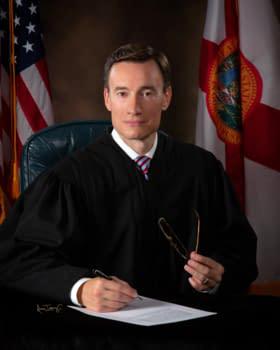Legacy Post Disclaimer
This is a #Legacy post imported from The Apalachicola Time’s previous platform. If you’re experiencing issues with this article, please email us at news@nevespublishing.com.
Time to be a Maccabee
I am perplexed as to how I found a plastic menorah at a
garage sale in Eastpoint. How had it found its way there?
It was likely not from a Jewish home. This I based not on any
official U.S. Census calculation, but entirely on supposition. Trust me here,
Jews have a way of knowing who are members of the tribe, and in the Panhandle its
often no more than you and I have fingers and toes.
As a plastic menorah with little lightbulbs in it, this was a
decoration, and not a religious artifact. Those menorahs lit on Hanukkah, which
started Sunday night and runs through Monday, are made of brass or silver, sometimes
out of stone, and in them are set colorful candles that must be kindled with
actual flame and wax, for eight straight nights. This commemorates how long a
teeny-tiny crucible of oil lasted, many centuries ago, when it should have
burned out much earlier.
The miraculous combustion of oil that remained aflame for so
long took place about 160 years before Jesus was born, in the temple in Jerusalem
after it was ransacked by the Greeks who ran Syria. To be frank, this behavior was
par for the course, as far as how Jewish holiness was treated. Its called
paganism, at least in Jewish eyes, and happened too many times way back when.
These polytheistic pagans didnt just storm the temple and break
up stuff, like snapping the seven-branched menorah into pieces that littered
the Galilean ground like seashells. These pagans went further, and wreaked
desecrations that sent bystanders convulsing in mortified disbelief.
There is, however, a hero of the story, Judah Maccabee, and
his band of soldiers the Maccabees, because the word means hammer in Aramaic.
Maccabee, however sweetly the syllables pop off from the mouth, is not the
important part of the name here, as it was likely added later to attest to his
tough guy status as a soldier who fought off the enemy.
The name Judah is the important part, because there is no
more Jewish name than Judah, the earliest namesake many generations earlier
being the fourth son of Jacob and Leah, whose name is synonymous with the Kingdom
of Judah, the land of Judea and the word Jew.
Judah Maccabee was the son of a high priest and what
bothered him so much, what I learned in Hebrew School, was not so much the
ransack. That was not that unusual; for some crazy reason, pagans were keen on
desecration. What pissed off Judah so much was that there were Hebrews who went
along with it, this assimilation into pagan culture. They saw this as a
weakening of their identity as Jews, full of compromises that would obliterate
what they understood to be their mandate to keep Gods commandments, and to
remain holy.
And so after the Maccabees won a military victory, and the
small amount of spilled oil lasted eight full days, the rabbis decided to add a
holiday to the Jewish calendar based on a comparatively obscure book in the
Bible. They named it Hanukkah, which means dedication, since after the military
victory, the Jews rededicated the temple.
The fact the holiday comes around the time of Christmas is coincidental,
since the fighting ended on a day in the Jewish calendar that usually falls in
December. Because oil is a big part of the holiday, and because potatoes were
an available staple in Eastern Europe, potato pancakes, called latkes, are eaten
as a festive meal. In Israel they prefer doughnuts for their celebration. This is
probably because as a general rule, Israelis are respectful of their European forebears
traditions, but keen on breaking them. Such as not being passive in the face of
violent aggression, and of being physically mighty as a Maccabee.
The gist of the holiday, though, is not about military
warfare, but about spiritual warfare. About being so dedicated to a set of
teachings and commandments that you do what it takes to defend them against destruction.
And knowing that even more than arms, it takes heads and hearts, each committed
to preserving holiness against the dilutions and corruptions and twistings that
so often are the residue of popular culture.
While this dedication to the Jewish way of life is particular
to my people, it is easy to see how this theme can be translated to others as
well. It says that sometimes, it is not enough to just hope for the best when
beliefs and understandings are assailed. That there are times actions must be
taken to fight for that holiness, through a hammer-hard dedication to that mission.
All around us, along the Panhandle, there are people of all
religions who are doing just that. Which is why I have a better idea now why
that plastic menorah was found at an Eastpoint yard sale.
David Adlerstein had his bar mitzvah at Congregation Tifereth
Israel in Columbus, Ohio.




Meet the Editor
David Adlerstein, The Apalachicola Times’ digital editor, started with the news outlet in January 2002 as a reporter.
Prior to then, David Adlerstein began as a newspaperman with a small Boston weekly, after graduating magna cum laude from Brandeis University in Waltham, Massachusetts. He later edited the weekly Bellville Times, and as business reporter for the daily Marion Star, both not far from his hometown of Columbus, Ohio.
In 1995, he moved to South Florida, and worked as a business reporter and editor of Medical Business newspaper. In Jan. 2002, he began with the Apalachicola Times, first as reporter and later as editor, and in Oct. 2020, also began editing the Port St. Joe Star.